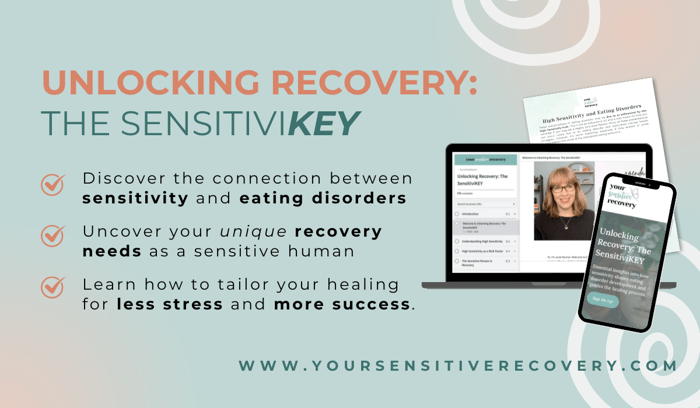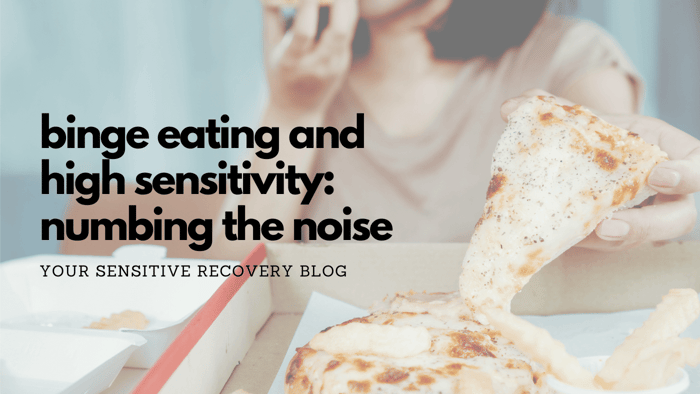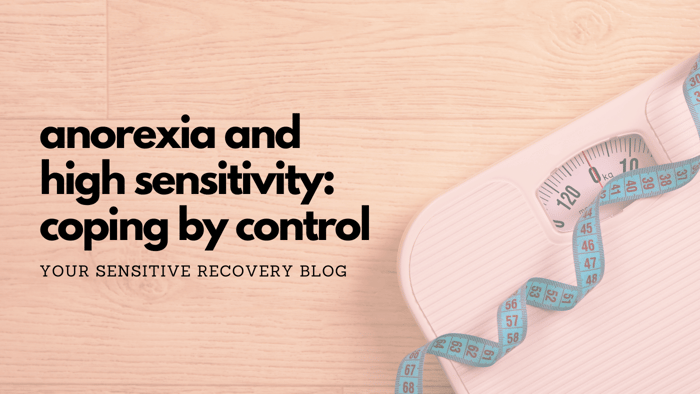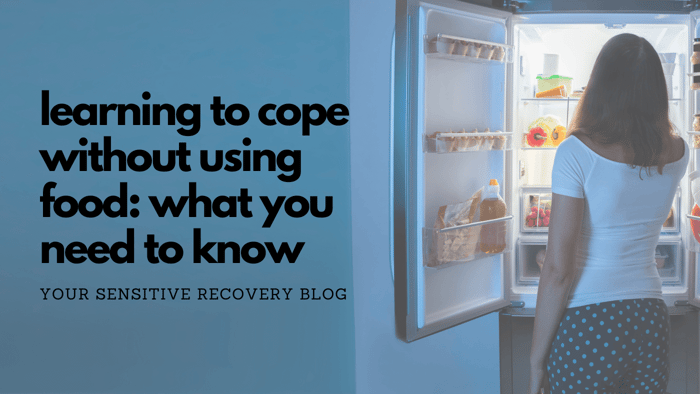Welcome back to my blog series exploring High Sensitivity in different eating disorder diagnoses. This week, I'm diving into Binge Eating Disorder, sometimes referred to as compulsive eating or overeating. As an eating disorder therapist and Highly Sensitive Person (HSP), I’ll walk you through the often-overlooked connection between binge eating symptoms and the traits of High Sensitivity, scientifically referred to as Sensory Processing Sensitivity.
Binge eating is not about a lack of willpower. It’s a frustrating yet simple coping strategy that is deeply misunderstood and heavily stigmatized in our culture.
It’s time to dispel the shame so that sensitive souls struggling with this eating disorder can recognize their underlying needs and break free from the cycle of overeating and self-criticism.
👉 NOTE: While this post focuses on Binge Eating Disorder, much of the content can also apply to folks with Other Specified Feeding and Eating Disorders (OSFED), and sub-clinical disordered eating where eating beyond comfortable fullness is a frequent behavior.
What is Sensory Processing Sensitivity?
Being an HSP means you have a biological trait called Sensory Processing Sensitivity, colloquially known as High Sensitivity. You're a deep thinker, a deep feeler, and you experience the world with extraordinary awareness.
Sensitivity shows up on a spectrum. There's the low end, the middle range (most common), and the high end (hello, HSP!), which encapsulates roughly 15-30% of the population.
While High Sensitivity comes with innate gifts like deep empathy, on-point intuition, and free-flowing creativity, it also comes with challenges. A world that prizes toughness over tenderness can leave HSPs feeling out of place, overwhelmed, or emotionally exposed.
"I cry a lot. It's so frustrating because other people think it's a weakness. When people tell me I'm 'too sensitive,' it just makes me feel worse, like I'm defective." - Becca (19y)*For some HSPs, the weight of their emotions and the constant sensory input can feel unbearable - and food can serve as a temporary reprieve.
Without recognizing and therefore being able to tend to their sensitivity, HSPs can fall into a cycle of bingeing to numb what feels like just too much.
Understanding Binge Eating Disorder
Binge eating is characterized by having a relatively large amount of food (what most folks would consider large) in one eating episode and the sense of being out of control. This "out-of-control-ness" can show up as the inability to stop eating when comfortably satisfied or full, eating much more quickly than normal, and/or feelings of disgust and shame during and after the binge.
The diagnostic criteria for Binge Eating Disorder (sometimes referred to as BED) also states that the binges are not regularly followed by compensatory behaviors such as purging or fasting.
However, many folks who struggle with binge eating attempt to "make up" for binges by cutting back on calories the next day, thus creating a vicious cycle.
Restricting leads to intense hunger, which leads to binge eating (sparks shame), which leads back to restriction (sparks hope), then back to intense hunger (more shame), and so forth. This is a very difficult pattern to break because it is not only fueled by painful emotions but it is also biologically driven.
Did you know that this same cycle can occur even when there isn't actual physical restriction but simply mental restriction? Mental restriction comes from self-shaming thoughts like, "I shouldn't eat that...I should wait until x time to eat...I can't be hungry yet"...etc.
Whether called binge eating, compulsive eating, or "overeating," this behavior is one that is incredibly misunderstood. In fact, I've seen clients show up in my practice time and time again, reporting binge eating episodes only to find with gentle exploration that they are actually under-eating or eating completely normal amounts of foods. Why is this?
Shame and stigma.
Food is intensely tied to morality in our culture and it is absolutely ruining people's relationships with food and their ability to trust their bodies.
Why Highly Sensitive People May Develop Binge Eating
Sensitive humans take in a lot of information from their environment, and because of that, we're prone to overstimulation. This can lead to intense fatigue, mental and emotional overload, and social burnout.
One reason HSPs may turn to binge eating is because food provides a quick, easily accessible way to physically, mentally, and emotionally recharge.
Food, of course, offers a quick boost. Carbohydrates, in particular, provide an almost instant source of energy, and certain foods may temporarily soothe an overtaxed nervous system. Because sensitive folks feel everything so deeply, the soothing or relaxing effect of food is powerful.
Beyond nourishment, eating can be deeply comforting for sensitive people on a sensory level. In some ways, tasting, chewing, and swallowing can mimic the grounding effects of a hug or weighted blanket, especially when eating to the point of fullness or even over-fullness. While this may not feel good in the long run, for the moment it offers a sense of stability and containment that Highly Sensitive People often crave.
Speaking of hugs, food can also be a relational salve. For people who have felt misunderstood or judged by others (as many sensitive folks do), food offers a form of companionship that feels safe.
"Food is there for me whenever I need it. I look forward to eating in a way I've never looked forward to spending time with people. Food never rejects me." - Kaya (28y)*Food does not criticize us, make demands of us, or abandon us. In moments of emotional pain, binging can feel like a reliable source of comfort.
Turning to food is not by any means inherently wrong. We all do it, and that's OK. But as I mentioned earlier, our society, which is so heavily steeped in diet culture and weight stigma, makes it really hard to heal a relationship with food when it's constantly feeding the shame cycle that may be driving someone to cope with food in the first place.
What to Focus on Instead of Stopping the Behavior
As we grow up, many HSPs get the message that their sensitivity is a problem and something they have to fix. This can translate into a belief that healing from disordered eating requires someone to become less sensitive and reign in their needs.
The goal in healing from binge eating disorder is not to remove the need and craving for comfort but to find more sustainable ways to meet those needs - ways that truly honor sensitivity.
Key Areas to Focus on in Recovery:
- Create Gentle Structure: Prioritizing consistent, nourishing meals and snacks goes a long way in reducing biological triggers for bingeing.
- Understand High Sensitivity: Learn about your trait. Increase your awareness of its challenges and its gifts.
- Grieve the Pain: Acknowledge the struggle of living as a sensitive person in an insensitive world and the pain inflicted on you by others and the culture at large.
- Practice Unconditional Self-Compassion: It is essential to counteract shame when attempting to break the cycle of guilt that can fuel binge eating.
- Build in Other Soothing Strategies: Rather than taking food away as a coping technique, add in other sensory-friendly ways to cope (e.g. soft textures, music, deep breathing).
- Focus on Emotional Awareness: Practice frequently identifying and naming your emotions. Google "Feelings Wheel" if you need help. They're super useful!
- Seek Validation: Connect with other HSPs for support and educate loved ones about your unique needs.
Finding True Relief
If you recognize yourself in these patterns, please know that you are not alone. There is nothing wrong with you for seeking comfort in food. As a Highly Sensitive Person, it makes sense that you would turn to something as readily available, soothing, and reliable as food to cope.
But you deserve more than just temporary relief.
You deserve comforting strategies that truly support you and honor your sensitivity. And you deserve a relationship with food that feels peaceful and balanced. With curiosity, compassion, and the right tools, full recovery is absolutely possible.
You are not too much and your sensitivity is not a flaw. You are learning to care for yourself in a way that feels both effective and safe.
Stay tuned for more posts in this series exploring how High Sensitivity influences the development and maintenance of other eating disorders and why addressing sensitivity is key to a full recovery!
* Names and other identifying details have been changed to protect privacy.
✨ Josie Munroe, LMFT is a licensed therapist and owner of JosieMunroe.com and Your Sensitive Recovery. As a recovered clinician and Highly Sensitive Person, she loves supporting others on their journeys to form new, empowered relationships with food, their bodies, and their sensitivity. Join the newsletter for a weekly boost of hope and inspiration. You deserve a recovery that works for you! ✨





